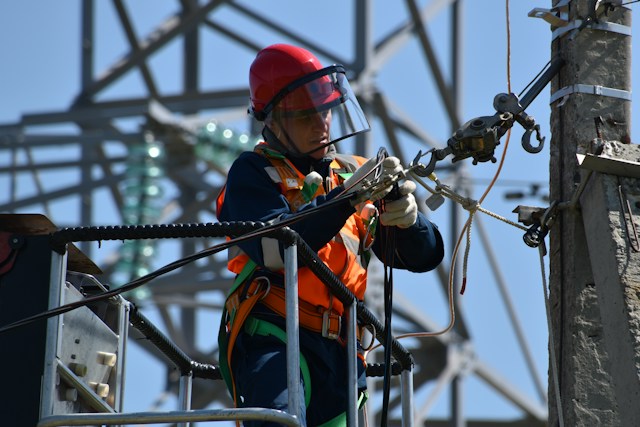When you think about the future, what comes to your mind? Flying cars, virtual reality, time travel? While these may be interesting, the real future lies in something much closer to home – your energy management. Today, we’re delving into a topic that might seem complex, but it’s making a huge impact on our everyday lives. We’re talking about the Internet of Things (IoT) and how it’s revolutionizing the way we manage energy in our homes. The promise of IoT extends to energy efficiency, renewable energy, power monitoring, and much more.
The Basics: Understanding IoT in Energy Management
Before we delve into the nitty-gritty, it’s important to understand what we mean when we say IoT in energy management. IoT refers to a system of interconnected devices that communicate and exchange data with each other. In the context of energy, these devices help us manage and monitor our energy consumption in real-time, leading to increased efficiency and lower costs.
A lire également : Best practices for designing a smooth conversation with a chatbot
For example, imagine a smart thermostat that adjusts the temperature based on the weather outside, or a washing machine that operates at off-peak times to save on electricity. These are just a few examples of how IoT devices are shaping our energy management systems, making them smarter and more efficient.
Enhancing Efficiency through Real-Time Monitoring and Control
One of the most significant ways in which IoT devices are transforming home energy management systems is through real-time monitoring and control. By equipping your home with smart devices like energy meters, thermostats, and smart plugs, you can monitor your energy consumption in real-time and make adjustments as needed.
Cela peut vous intéresser : How Can Biometric Recognition in TVs Personalize Viewing Experiences for Different Family Members?
Let’s take the example of a smart thermostat again. With this device, you can set the temperature of your home from anywhere using your smartphone. This means you can turn off the heating or cooling when you’re not at home, saving considerable energy. Similarly, smart plug can help you monitor the energy consumption of individual appliances and turn them off remotely when they’re not in use.
Using Data for Predictive Maintenance
Another significant advantage of IoT devices in energy management is their ability to predict and prevent potential issues through predictive maintenance. This is possible thanks to the huge amount of data these devices collect and analyze.
For instance, imagine a smart HVAC system equipped with various sensors monitoring temperature, humidity, and performance. By analyzing this data, the system can predict when a part is likely to fail and alert you. This way, you can take care of the issue before it becomes a major problem, avoiding costly repairs and energy waste.
Predictive maintenance is not just limited to HVAC systems. It extends to all energy-consuming appliances in your home, from the refrigerator to the washing machine, leading to overall improved efficiency and cost savings.
IoT and the Smart Grid: A Renewable Future
When talking about energy management, we can’t ignore the role of the grid. And when we pair IoT with the grid, we get something even more exciting – the smart grid. A smart grid is a modern power grid that uses digital technology and IoT devices to monitor and manage the flow of energy from all sources, including renewable ones.
With the help of IoT devices, homeowners can not only monitor their energy consumption but also their production, if they have solar panels or other renewable energy systems. By feeding this data to the smart grid, they can sell their surplus energy back to the grid, creating a more efficient, sustainable, and balanced energy system.
Building the Future of Energy Management with IoT
So, what’s next for IoT in home energy management? The possibilities are endless. As technology continues to advance, we can expect to see more sophisticated IoT devices, capable of more precise monitoring and control, more accurate predictive maintenance, and greater integration with the smart grid.
But it’s not just about technology. It’s also about us, the users. As we become more educated and aware of our energy consumption, we can use these devices to make smarter choices and contribute to a more sustainable future.
Therefore, it’s safe to say that the IoT is not just transforming our home energy management systems. It’s transforming the way we think about and use energy. So, the next time you think about the future, think about this. The future is here, and it’s smart, efficient, and sustainable.
Personalizing Home Energy Usage with IoT
The personalization of energy usage is another significant transformation IoT devices offer to home energy management systems. As IoT technology becomes more sophisticated, it allows homeowners to tailor their energy consumption according to their preferences and lifestyles. IoT enabled devices such as smart thermostats, lights, and plugs can be programmed to function at specific times, enhancing energy efficiency while ensuring the home environment is to the occupants’ liking.
Let’s consider a scenario where a homeowner prefers to wake up to a warm house. With an IoT enabled thermostat, they can program it to start heating the house before they wake up. This not only ensures a comfortable environment but also optimizes energy usage as the heating isn’t running all night. Furthermore, the homeowner can use real-time data on their energy consumption to adjust their usage habits, further enhancing energy efficiency.
Beyond individual households, IoT devices also contribute to a more personalized, efficient, and balanced energy distribution at the community level. With the advent of smart grids, homes can communicate their energy needs and supplies with each other and the grid. This allows for the optimization of energy distribution based on real-time data, reducing energy wastage and enhancing overall energy efficiency.
IoT for a Sustainable Future: The Final Picture
As we’ve explored, IoT devices are instrumental in transforming home energy management systems, making them smarter, more efficient, and user-friendly. They allow homeowners to monitor their energy consumption in real time, make data-driven adjustments to their usage habits, and even predict potential issues through predictive maintenance.
The impact of IoT in home energy management goes beyond individual homes and extends to the broader energy system. By integrating with smart grids, IoT devices contribute to a more balanced and efficient energy distribution, facilitating the integration of renewable energy sources.
However, the transformation of energy management with IoT isn’t just about technology — it’s also about people. It calls for a shift in our mindset towards greater consciousness of our energy consumption and a commitment to sustainable living. As consumers, we have the power to drive this change by making informed choices about our energy usage and advocating for the adoption of IoT technology in our homes and communities.
In conclusion, as we look towards the future, it’s clear that IoT will play a central role in shaping our energy landscape. It promises a future where energy management is not just smart and efficient, but also sustainable and user-centered. This future is already here in many ways, and it’s up to us to embrace it. After all, when it comes to energy management, every kilowatt saved counts.











